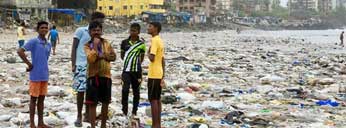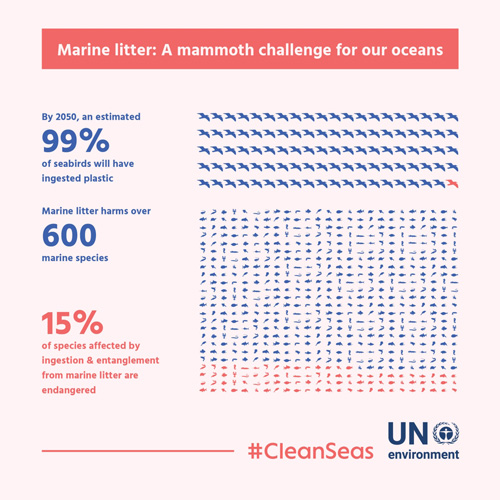UN pulling out all the stops to rid oceans of plastic

With more than 8 million tonnes of plastic leaking into the ocean each year, equal to dumping a garbage truck of plastic every minute, UN Environment has launched a major global #CleanSeas campaign to end marine litter, with ten countries already on board, as well as Dell Computers, singer Jack Johnson, actor Adrian Grenier and media personality Nadya Hutagalung.
The global campaign intends to eliminate major sources of marine litter such as microplastics in cosmetics and the excessive, wasteful usage of single-use plastic, by the year 2022.
Launched at the Economist World Ocean Summit in Bali, the #CleanSeas campaign is urging governments to pass plastic reduction policies; targeting industry to minimise plastic packaging and redesign products; and calling on consumers to change their throwaway habits – before irreversible damage is done to our seas.
Erik Solheim, Head of UN Environment, said, "It is past time that we tackle the plastic problem that blights our oceans. Plastic pollution is surfing onto Indonesian beaches, settling onto the ocean floor at the North Pole, and rising through the food chain onto our dinner tables. We’ve stood by too long as the problem has gotten worse. It must stop."
Throughout the year, the #CleanSeas campaign will be announcing ambitious measures by countries and businesses to eliminate microplastics from personal care products, ban or tax single-use bags, and dramatically reduce other disposable plastic items.
Ten countries have already joined the campaign with far-reaching pledges to turn the plastic tide. Indonesia has committed to slash its marine litter by a massive 70% by 2025; Uruguay will tax single-use plastic bags later this year and Costa Rica will take measures to dramatically reduce single-use plastic through better waste management and education.
The tonnes of plastic that ends up in the oceans, wreaks havoc on marine wildlife, fisheries and tourism, and costs at least US$8 billion in damage to marine ecosystems. Up to 80% of all litter in our oceans is made of plastic.
According to some estimates, at the rate items such as plastic bottles, bags and cups after a single use are dumped, by 2050, oceans will carry more plastic than fish and an estimated 99% of seabirds will have ingested plastic.

Media personalities like Nadya Hutagalung, singer-songwriter and UN Environment Goodwill Ambassador Jack Johnson and a host of other personalities are support #CleanSeas by calling on the cosmetics industry to stop adding microplastics to their products.
As many as 51 trillion microplastic particles – 500 times more than stars in the galaxy – litter the seas, seriously threatening marine wildlife.
Globally recognised brands are also joining the fight. Dell Computers has unveiled a commercial-scale supply chain using plastic which has been fished out of the sea near Haiti. The computer giant will use the recovered ocean plastic in its product packaging.
"Dell is committed to putting technology and expertise to work for a plastic-free ocean," said Dell's Vice President for Global Operations Piyush Bhargava. "Our new supply chain brings us one step closer to UN Environment's vision of Clean Seas by proving that recycled ocean plastic can be commercially re used."
All these actions will be crucial to stemming the tide of marine litter, since 20 times more plastic is produced than in the 1960s. Around one-third of all plastic is used for packaging. By 2050, plastic production will have to grow three to four times to satisfy growing demand. A large portion will end up in oceans where it will remain for centuries.
Major announcements are expected during The Ocean Conference in New York at the UN Headquarters 5-9 June, and the December UN Environment Assembly in Nairobi, Kenya.
The #CleanSeas campaign is a global movement targeting governments, industry and consumers to urgently reduce the production and excessive use of plastic that is polluting the earth’s oceans, damaging marine life and threatening human health. UN Environment aims to transform all spheres of change - habits, practices, standards and policies around the globe to dramatically reduce marine litter and the harm it causes.
Ten countries have already joined the campaign: Belgium, Costa Rica, France, Grenada, Indonesia, Norway, Panama, Saint Lucia, Sierra Leone and Uruguay.
(PRA)Copyright (c) 2017 www.plasticsandrubberasia.com. All rights reserved.
















































